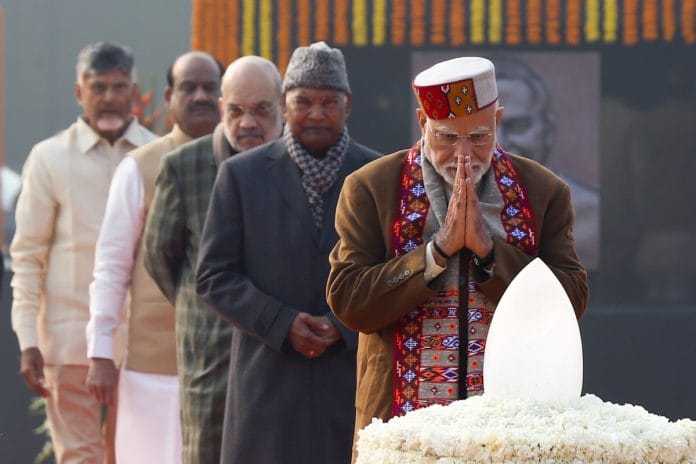Thank you dear subscribers, we are overwhelmed with your response.
Your Turn is a unique section from ThePrint featuring points of view from its subscribers. If you are a subscriber, have a point of view, please send it to us. If not, do subscribe here: https://theprint.in/subscribe/
The General Election saw the Bharatiya Janata Party’s focus shifting from development to a more centralised Modi-focused rule. As a result “Modi Ki guarantee” and “abki baar 400 paar” drifted the Sangh as well as the caste and religious minorities away from the BJP.
The BJP quickly rectified its mistakes, coupled it with a sway of cash transfer promises and is now aggressively pushing back against the Congress on the Constitution debate.
The BJP is now backing freebies or “revdi” as Prime Minister Modi once called it ridiculing the idea. Union Minister Shivraj Singh Chauhan’s tried and tested idea in Madhya Pradesh was copy-pasted in other states which eventually worked and the party won the crucial Maharashtra election.
Next month, the saffron party is facing the Aam Admi Party which has won all the assembly elections in Delhi since the party came into existence. AAP was the first party to introduce doles in 2015 when it contested and won the Delhi assembly election.
But why this sudden change of mind? While it was understandable in Maharashtra as the saffron party and its ideological patron the Rashtriya Swaymsevak Sangh (RSS) wanted their leader at the helm of state affairs, the party made similar promises in Haryana, and now in Delhi.
Taking a macro view of the situation since the June 4 mandate and putting the One Nation One Poll bill (ONOP) into perspective may help us understand the picture. While the politics of doles and The Constitution (129th Amendment) Bill, 2024, as the ONOP is called, may seem unrelated a common link of development joins these two.
This is the second time the BJP has brought in a highly contested bill, just after winning the election, the abrogation of Article 370 being the first. They know the effects of these bills, it serves their long-term goals and also doesn’t hamper the short-term power prospects. Bill proposing the revocation of Article 370 was passed by both houses. Most parties supported the bill probably because of the public sentiment and there was no reason to take the BJP head on when it had a clear majority.
Constitutional amendment bills like the ONOP cannot be introduced as money bills and have to clear both houses.
In the last 10 years, the BJP has introduced several important bills as money bills that reduce the Rajya Sabha’s role as an adviser. A money bill doesn’t need to be passed in the Rajya Sabha as other bills. BJP had introduced the Aadhaar Act, 2016, the Prevention of Money Laundering Act (PMLA), and the Foreign Contributions Regulations Act (FCRA) as money bills. Both PMLA and FCRA acts are heavily used to silence government critics.
Perhaps that’s why “400-paar” was needed with the BJP crossing the 350 mark. In the past decade, when the BJP didn’t have a majority in Rajya Sabha on several occasions, it struggled to get bills passed. To join the dots, more assembly election wins mean more seats in the Rajya Sabha which will ensure a smooth passage for any bill.
The ONOP bill has been sent to a Parliamentary committee for discussion amid various parties alleging that it will finish regional parties. Early discussions on the ONOP bill indicate the perturbation within the BJP-led National Democratic Alliance (NDA).
Mixing state issues like water, electricity, education, and law and order with national interests like foreign and national security policy might create an environment where the spillover effect of one over the other might become a natural outcome. It can cause damage to both the public as well as the regional political parties.
Secondly, the infrastructural, security and human resources needed for conducting assembly elections in 28 states and 3 union territories along with a national General Election far outweigh the benefits.
The “saving resources” rationale given by the ruling dispensation behind the simultaneous polls falls flat. As far as the Model Code of Conduct hampering the schemes is concerned, the polls in Delhi will affect only Delhi residents and that too for a month or so. If there is a single poll for state Assemblies and the Parliament nation it will take more than three months during which the entire nation will be at a standstill.
In 2019 Haryana and Maharashtra elections happened together, but in 2024 it wasn’t the case. The Election Commission delayed the announcement of Maharashtra elections, which were later held with Jharkhand while announcing the Jammu & Kashmir and Haryana polls schedule.
If the government really wanted to save money it was possible to club the four state elections together. Similarly, several state elections can be clubbed together by shortening or extending their tenure by a few months, but that’s nowhere on the government’s agenda.
These pieces are being published as they have been received – they have not been edited/fact-checked by ThePrint


